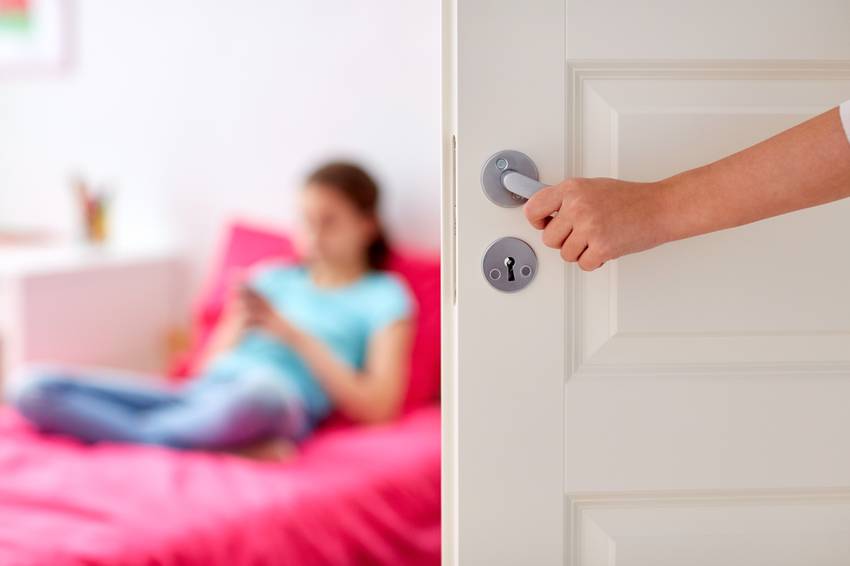Why does privacy matter? Privacy is a basic human need. We need it to be able to think clearly, to analyse, to imagine, and to visualize certain aspects of our lives without interruptions. Like adults, children also need ‘me-time’ to reflect and gather their thoughts. Parents often don’t feel it is important to allow their children to be alone, as they consider secrecy to be inappropriate. Privacy and trust can go hand in hand. Respecting and trusting your children’s private lives is key to building a healthy relationship.
Growing up is not without its challenges. As children age, they face big challenges, such as figuring out who they are and where they fit in. Their brains are also rapidly developing. It is only natural that they would want more privacy and space while they work on these things.
This time can also be difficult for parents. After all, many unknowns with your children can be unsettling at times; but it is necessary to recognize that wanting more privacy does not mean your child has something to hide.
Understanding the relationship between trust and privacy, how to respect your child’s privacy, and when to spy will help you raise a trustworthy, independent teenager. In this blog, we will answer the question – ‘why does privacy matter.’

The Link Between Privacy & Trust
As children grow up, they want to be trusted to do more things than when they were younger. Teens want to be viewed as responsible, mature, and independent. It can be a great thing for teens to have some privacy and feel secure.
However, keep in mind that teens may also experience physical changes that can make privacy more important. If a child used to feel comfortable changing their clothes in front of their parents, they might no longer wish to do so in the bedroom. To protect their privacy, they may lock the bedroom or bathroom doors. This is normal and not cause for concern.
Teens might feel more at ease asking questions and confiding in their same-gender parents about certain topics. This is especially true for teens who need guidance regarding romantic relationships and the physiological changes that they are experiencing.
Why Does Privacy Matter For Children?
Giving children the privacy they desire helps them be more independent and boosts their self-confidence. You can trust your instincts as a parent and know what your teenager is doing.

Trust issues may be the reason you and your teenager are fighting over privacy. Children who feel their parents are invading their privacy can lead to more conflict at home. Teens may feel that their parents don’t trust them or expect them to behave like school-aged children.
If this is your experience, take a step back to see where you can give your teenager more privacy and space without compromising their safety and guidance. You may suspect your teen is hiding some information.
Give Privacy to Demonstrate Trust
Teens must have the space they need, but they may not be ready to handle the adult world. They still need your help. Teenagers can make snap decisions and not always consider the consequences.
Children still need your support and advice. You must also be in contact with them regularly and communicate on a regular basis. It is essential to give them control and not allow them to be isolated. This can lead to problems later on. You must balance their privacy with your security and safety.
Finding the right balance
To determine the boundaries, you need to decide what information you need and what information you don’t need. You need to know the whereabouts of your teen, their plans for the future, and what time they will return home.
You don’t have to know everything they shared with their friends. Some teens will be willing to share their details with you, but don’t be alarmed if they don’t.
You can also give your teen privacy in other ways:
- If they prefer, they can see the doctor in private
- Before they take something out of their backpack or wallet, ask.
- Give them their time
- Before entering their room, knock on the door.
- If they leave their cell phone at home, you shouldn’t snoop through texts and emails
- Leaving their journals and notebooks alone
- Allow them to have private conversations with siblings or friends without asking for too many details.
- Please respect their privacy by not looking through their belongings
Earning Privacy Through Responsibility
The best way to find out how independent your child is is to assess how responsible they are with their responsibilities. Is it possible for them to show that they are punctual, complete their homework on time, respect their curfews, and do their chores on time? You can let your guard down a bit if they are capable of doing these things without much nagging.
There should be a direct correlation between the honesty and responsibility that kids show and the privacy they have. If your teen is uncooperative or disrespectful, you can give them some privacy for a time.
Online Privacy
A teen’s need for privacy on social media is the same as their real-life privacy. It is your job to guide and mentor them in safe behavior. You should role-model appropriate social media use by not posting photos about your children on your own feeds without their permission.
Teens need to earn your trust when it comes to social media. However, once they have gained your trust, it is fair to allow them to use their privacy to help them mature and be more independent.

Be a Friend
Everybody makes mistakes and has to fail in their lives. But that doesn’t mean the end of life. Our mistakes are lessons that we learn from, and our children do too. This gradually makes us more pro- and vigilant in our decision-making. Let your children have fun in their own time. If they make mistakes, it will eventually help them grow and be more prepared to tackle the inevitable. You can only be a friend to them, help them, and accept them as they are.
A word from Dr. Neha Mehta
Teens who are too much monitored can be very frustrating for them. Over-looking them or asking for too many details could make them feel agitated. Our goal is to raise teens in a safe and secure environment that allows them to be themselves and receive the advice and support they need.
Also, Read
What Is Sexual OCD? Diagnosis And Treatment
What Happens In Marriage Counselling? 7 Things To Expect From Relationship Counselling
What is Counselling? 7 Ways In Which Counselling Can Help You













